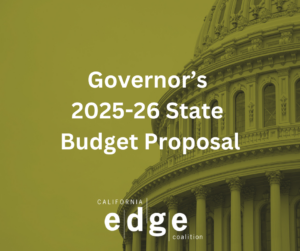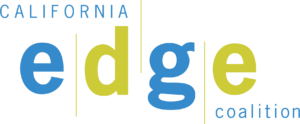 On January 10th, California Director of Finance Joe Stepenshaw provided details of Governor Gavin Newsom’s 2025-26 state budget proposal – $322.2 billion proposal with no deficit, including $228.9 billion in general fund spending, and $16.5 billion projected revenue surplus due to a stronger economy and stock market. View the Full Budget Proposal here.
On January 10th, California Director of Finance Joe Stepenshaw provided details of Governor Gavin Newsom’s 2025-26 state budget proposal – $322.2 billion proposal with no deficit, including $228.9 billion in general fund spending, and $16.5 billion projected revenue surplus due to a stronger economy and stock market. View the Full Budget Proposal here.
To achieve a balanced budget and further promote government efficiencies, the Budget assumes permanent reductions to nearly all state departments’ budgets. These reductions include eliminating up to 10,000 vacant positions for an estimated savings of $671 million, and reducing state operations expenditures by almost 8 percent, which would result in $1.5 billion in savings.
True to California values, the Governor’s budget proposal shows investments that prioritize educational equity and affordability, workforce development preparedness with flexibility, and economic growth.
Budget Reserves include $10.9 billion for the Rainy Day Fund, $1.5 billion for the Public School Rainy Day Fund, and $4.5 billion for the Special Fund for Economic Uncertainties.
Education Funding
The proposed Budget reflects a slight decrease in overall education funding while still introducing targeted initiatives in California’s higher education landscape. The Budget mainly upholds support for key initiatives and introduces new career-focused programs. Overall, education funding reduction poses a challenge for California’s higher education institutions.
For the three higher education segments and the California Student Aid Commission, the Budget proposes total funding of $45.1 billion ($28.5 billion General fund and local property tax, with $16.6 billion in other funds) – a 0.6-percent decrease (totaling $282 million) from the 2024-25 budget year.
Master Plan for Career Education
- The Budget allocates $100 million in new investments for the implementation of multiple components of the Master Plan, specifically highlighting, $93 million one-time and $7 million ongoing to build and scale Credit for Prior Learning efforts to ease turning real-world experience into college credit. Part of this funding is to create the Career Passport Initiative – a digital tool with academic transcripts verifying skills and credentials earned outside the classroom, such as work or apprenticeships. This investment has the potential to benefit 250,000 Californians, including 30,000 veterans.
- The Budget proposes $5 million in ongoing General Fund to the Government Operations Agency (GovOps). This statewide coordination agency will use this allocation to establish a state planning and coordinating body to improve forecasting needed skills, as well as coordination of resources to improve and implement the six principles highlighted in the Master Plan for Career Education.
- The Budget proposes $4 million one-time funding to support regional coordination for career education and training through Labor and Workforce Development Agency.
- The Budget also proposes to streamline applications for TK-12 career technical education into a single consolidated application to include dual enrollment pathway programs as allowable uses for funds allocated through the $1.8 billion Student Support and Discretionary Block Grant. This initiative provides additional funding to County Offices of Education for various student support and enrichment activities – such as dual enrollment partnerships and career technical education.
California Community Colleges (CCC)
- The Budget allocates $133.5 million one-time and $29 million ongoing to scale a common cloud data platform across the CCC system, that will integrate the Program Pathways Mapper AI, eTranscript California, Mapping Articulated Pathways, and CSU Transfer Planner – all that reinforce investments in the Master Plan for Career Education.
- The Budget proposes $30 million base increase (total funding of $55 million ongoing) for Expanding the Rising Scholars Network, which will build on opportunities for college students who have been impacted by the juvenile justice system.
- CCC Categorical Program COLA receives a $16 million from Proposition 98 General Fund to provide a 2.43-percent COLA for select categorical programs and the Adult Education Program.
Student Financial Aid
- The Budget provides a total financial aid expenditure package of $3.1 billion ($2.6 billion to support Cal Grant – the largest entitlement program administered by the state, serving approximately 417,000 students).
- Middle-Class Scholarship receives $527.2 million.
- Golden State Teacher Grant receives $50 million to provide grants to applicants in the 2025-26 fiscal year.
Labor and Workforce Development Funding
- The Budget proposes $17 million one-time general Fund for the Regional Initiative for Social Enterprise Program (CalRISE). CalRISE provides financial and technical assistance to employment social enterprises to help them build the capacity to create and retain jobs in communities.
Employment social enterprises are businesses that provide jobs, on-the-job training, and specialized support to people who face high barriers to work, including homelessness, previous incarceration, substance use, or mental health issues.
Social Safety Net Funding
The Budget addresses immediate challenges while investing in long-term improvements drastically needed for more resilient and efficient benefits systems, ultimately benefiting workers, businesses, and the state economy.
Child Care
- The Budget included $7.1 billion for the Department of Social Services administered child care and developmental programs such as CalWORKs Stages One, Two, and Three, General Child Care, and various other state and local programs.
- The Budget maintains funding to continue the Cost of Care Plus Rate monthly payments for state-subsidized child care providers.
CalWORKs
- The Budget assumes $6.4 billion for CalWORKs expenditures. An investment of $3.2 billion toward other programs such as Child Welfare Services, Foster Care, California Community Colleges Child Care and Education Services, the Department of Developmental Service programs, and the Department of Child Support Services.
- CalWORKs Work and Family Well-Being Pilot: California was selected to participate in a federal pilot program to test alternative performance measures in the Temporary Assistance for Needy Families (TANF) program. The vision for California’s pilot is to build upon a strong foundation of supportive and barrier removal services to facilitate employment and well-being. The pilot will leverage the CalWORKs Outcomes and Accountability Review (Cal-OAR) framework to measure successful programs more holistically.
Overall, the Budget proposal offer new and continued investments in postsecondary education with flexibility for student-centered, career-focused programs with great opportunities into high-demand career pipelines.
With the release of the Governor’s January Budget Proposal, deliberations between the Governor’s Office and the Legislature will continue through May. EDGE remains engaged with both the administration and the Legislature to advocate for essential investments that create and sustain pathways to the middle class for all Californians.
EDGE will use these opportunities leading up to the May Revision to advocate and further uplift issues that result in a shared prosperity as outlined in our policy agenda.
For questions, please contact Jason Henderson, Policy Analyst at jhenderson@caedge.org
To receive legislative and budget updates, including advocacy tools, please sign up for our email list here.
